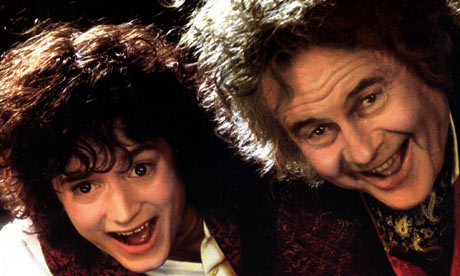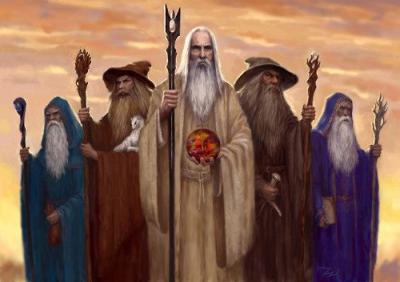I've been asked: "Why, when one can role-play an Ainu like yourself, would one chose to play as a Noldor Elf?" The simple answer: even the Valar chose to do so.
As spirits, the Valar have no fixed physical form, although they could assume any form they chose, or cast aside their shape altogether and travel formless and invisible through Arda. By preference, though, they often took the shapes of the
Children of Ilúvatar: Elves and then Men.
[The Valar] were filled moreover with the love of the beauty of the Elves and desired their fellowship. At the last, therefore, the Valar summoned the Quendi to Valinor, there to be gathered at the knees of the Powers in the light of the Trees for ever;
The Thought of Iluvatar cares for the Children of Iluvatar. But the Children do not understand this, even fearing the Caretakers.
But the Elves were at first unwilling to hearken to the summons, for they had as yet seen the Valar only in their wrath as they went to war, save Oromë alone; and they were filled with dread. Therefore Oromë was sent again to them, and he chose from among them ambassadors who should go to Valinor and speak for their people; and these were Ingwë, Finwë and Elwë, who afterwards were kings. And coming they were filled with awe by the glory and majesty of the Valar, and desired greatly the light and splendour of the Trees. Then Oromë brought them back to Cuiviénen, and they spoke before their people, and counselled them to heed the summons of the Valar and remove into the West
It is now that the elves divide, first into three tribes of Vanyar, Noldor and Teleri, but further into those from each tribe who are willing to take the Great March, and the Unwilling (Avari, in Quenya).
The smallest host and the first to set forth was ... The Vanyar; they are the Fair Elves, the beloved of Manwë and Varda, and few among Men have spoken with them.
Next came the Noldor, a name of wisdom, the people of Finwë. They are the Deep Elves, the friends of Aulë; and they are renowned in song, for they fought and laboured long and grievously in the northern lands of old.
My prior post lays some background Aulë's kinship with the Noldor.
Aulë it is who is named the Friend of the Noldor, for of him they learned much in after days, and they are the most skilled of the Elves; and in their own fashion, according to the gifts which Illúvatar gave to them, they added much to his teaching, delighting to tongues and in scripts, and in the figures of broidery, of drawing, and of carving. The Noldor also it was who first achieved the making of gems; and the fairest of an gems were the Silmarils, and they are lost.
JRRT elaborates further on their relationship.
the Noldor were beloved of Aulë, and he and his people came often among them. Great became their knowledge and their skill; yet even greater was their thirst for more knowledge, and in many things they soon surpassed their teachers. They were changeful in speech, for they had great love of words, and sought ever to find names more fit for all things that they knew or imagined. And it came to pass that the masons of the house of Finwë, quarrying in the hills after stone (for they delighted in the building of high towers), first discovered the earth-gems, and brought them forth in countless myriads; and they devised tools for the cutting and shaping of gems, and carved them in many forms. They hoarded them not, but gave them freely, and by their labour enriched all Valinor.
Compare to Aulë himself: the delight and pride is in the deed of making, not the owning, the giving not the hoarding. Here is how the Noldor shared when the last group of Elves arriving in the Noldor-built city of Tirion on completing the Great March to Valimar
last and latest [the Teleri Elves] came to Aman and the shores of Eldamar.
There they dwelt, and if they wished they could see the light of the Trees, and could tread the golden streets of Valmar and the crystal stairs of Tirion upon Túna , the green hill; but most of all they sailed in their swift ships on the waters of the Bay of Elvenhome, or walked in the waves upon the shore with their hair gleaming in the light beyond the hill. Many jewels the Noldor gave them, opals and diamonds and pale crystals, which they strewed upon the shores and scattered in the pools; marvellous were the beaches of Elendë in those days.
But the memory of Middle-earth under the stars remained in the hearts of the Noldor, and they abode in the Calacirya, and in the hills and valleys within sound of the western sea; and though many of them went often about the land of the Valar, making far journeys in search of the secrets of land and water and all living things, yet the peoples of Túna and Alqualondë drew together in those days.
Wanderlust is an important part of Elvish character, the Noldor more than any other. While the Vanyar were content to stay near the Valar, and the Teleri as often as not were content to stay where fate had already led them on the Great March, the Noldor were reputed explorers.
Fëanor [High Prince of the Noldor] and his sons abode seldom in one place for long, but travelled far and wide upon the confines of Valinor, going even to the borders of the Dark and the cold shores of the Outer Sea, seeking the unknown. Often they were guests in the halls of Aulë;
This urge is going to lead the Noldor back to Middle-Earth in time. Even there, their kinship with Aulë is manifest:
the Naugrim [Dwarves] gave their friendship more readily to the Noldor in after days than to any others of Elves and Men, because of their love and reverence for Aulë; and the gems of the Noldor they praised above all other wealth.
When many Noldor decided to depart Aman under Fëanor's leadership, not all went. Noldor passions ran high.
And of all the Noldor in Valinor, who were grown now to a great people, but one tithe refused to take the road: some for the love that they bore to the Valar (and to Aulë not least), some for the love of Tirion and the many things that they had made; none for fear of peril by the way.
The parting and how it occurred was a mortal blow to Aulë and the Noldor's relationship. We hear that Aulë never spoke of the Noldor again. The Noldor who left Aman did a similar thing to Aulë's name: the word in their Middle-Earth Sindarin language means not the inventive Ainu nor "invention" as it does in Quenya, but "shaggy."
In JRRT's literature, the Noldor go on to great things, even returning to Aman after the War of the Rings. But, after the chapter describing that first parting, Aulë appears very little: it is the Noldor that define Aulë, not the other way around.
Love, broken, is bitterest.
Who wins?
Nobody.









